 Leading Blog | Posts by Category |
 Leading Blog | Posts by Category |
02.13.09

Lincoln’s Lessons: Invest In Who You Are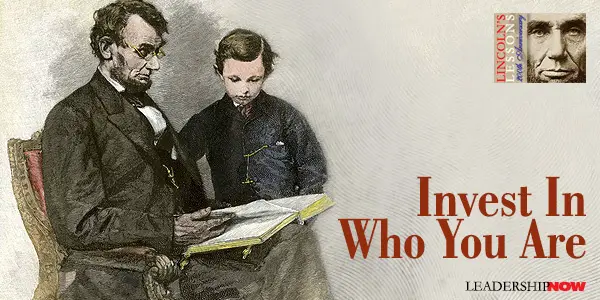
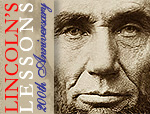 Newspaperman Horace Greeley once said of Lincoln, “Lincoln gladly profited by the teaching of events and circumstances, no matter how adverse or unwelcome….There was probably no year of his life that he was not a wiser, cooler, better man than he had been the year preceding.” This quality alone no doubt allowed Lincoln to grow into a fully integrated man. He invested in “who” he was and not just the “what” of the work he was doing. The “who” makes the “what.” The experiences of his life gave him the ability to face the negatives with clarity and resolve. He learned that, most often, the only way out is through. He learned to be able to judge the dilemmas that often arise from navigating strong convictions and the demands of the moment. This only comes about by knowing who you are and what you believe. The quality that most defined Lincoln was his internal consistency or wholeness. Integrity is the key to influence. Lincoln's contemporaries sensed his integrity in everything he did, a quality that still moves people today. Lincoln once described the workings of his mind to his friend Joshua Speed. He said, “I am slow to learn and slow to forget that which I have learned. My mind is like a piece of steel—very hard to scratch anything on it and almost impossible thereafter to rub it out.” William Lee Miller points out in Lincoln's Virtues, that Lincoln was good at finding the crux of the matter. “He would become a thinker in particular about moral ideals as they intersect with politics. And his qualities of mind meant that not only facts and ideas, once acquired, stayed with him, but that political and moral positions, once he worked them out, would not be lightly abandoned.” Lincoln was not without fear, however. Yet even with his doubts and fears, Lincoln possessed a hope that was rooted in character. “The hope is not that suffering will go away, for with Lincoln it did not ever go away,” writes Joshua Shenk in Lincoln’s Melancholy. “The hope is that suffering, plainly acknowledged and endured, can fit us for the surprising challenges that await.” Of Related Interest:
Posted by Michael McKinney at 12:10 AM
02.12.09

Lincoln’s Lessons: Humor Communicates Like Nothing Else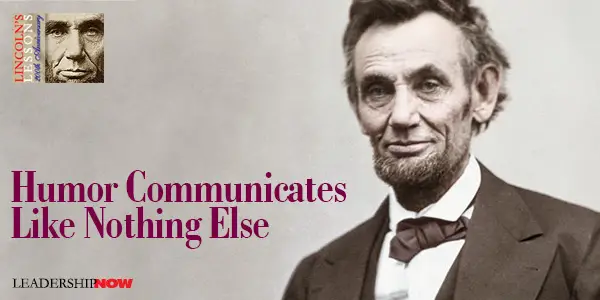
 Though he carried a great burden, he used stories and jokes to persuade people and to break the tension. He enjoyed sharing an anecdote, a joke or a story with nearly everyone he came into contact with. Battle correspondent Henry Villard recalled that “None of his hearers enjoyed the wit—and wit was an unfailing ingredient—of his stories half as much as he did himself. It was a joy indeed to see the effect upon him….A high-pitched laughter lifted up his otherwise melancholy countenance with thorough merriment. His body shook all over, and when he felt particularly good over his performance, he followed his habit of drawing his knees, with his arms around them, up to his very face.” Lincoln used humor to communicate more effectively. He used it to make a point, to motivate or just to make people feel at ease. He knew people were more easily persuaded by a story or a joke than in almost any other way. He said, “I believe I have the popular reputation of being a storyteller, but I do not deserve the name in its general sense, for it is not the story itself, but its purpose, or effect, that interests me. I often avoid a long and useless discussion by others or a laborious explanation on my own part by a short story that illustrates my point of view. So, too, the sharpness of a refusal or the edge of a rebuke may be blunted by an appropriate story, so as to save wounded feeling and yet serve the purpose. No, I am simply a storyteller, but story-telling as an emollient saves me much friction and distress.” Treasury official Chauncey M. Depew recalled, "Several times when I saw him, he seemed to be oppressed not only with the labors of the position, but especially with care and anxiety growing out of the intense responsibility which he felt for the issue of the conflict and the lives which were lost. He knew the whole situation better than any man in the administration and virtually carried on in his own mind not only the civic side of the government but all the campaigns. And I knew when he threw himself (as he did once when I was there) on a lounge, and rattled off story after story, that it was his method of relief, without which he might have gone out of his mind, and certainly would not have been able to have accomplished anything like the amount of work which he did." Not everyone appreciated his many jokes or thought they were appropriate. But Lincoln used them to good effect. He once said, “I tell you the truth when I say that a funny story, if it has the element of genuine wit, has the same effect on me that I suppose a good square drink of whisky has on an old toper; it puts new life into me. The fact is I have always believed that a good laugh was good for both the mental and the physical digestion.” Probably more to the point, he remarked, “I laugh because I must not weep—that’s all, that’s all.” Of Related Interest:
Posted by Michael McKinney at 01:14 AM

Abraham Lincoln Was Born 200 Years Ago TodayAbraham Lincoln was born 200 years ago on this day, February 12, 1809, in Hardin County, Kentucky to Thomas and Nancy Lincoln. Abraham was their second child and took his name from his paternal grandfather. He had an older sister named Sarah. He was the first President to be born outside the 13 original colonies. Also on this day, Charles Darwin was born. The world was changing. The Industrial Revolution was in full swing. The day before, Robert Fulton patented his steamboat. An invention that would prove to change the course of commerce throughout the world. A few weeks later, on March 4, James Madison took the oath as the 4th President of the United States, succeeding Thomas Jefferson.Just five years before, the nation doubled in size with the negotiation of the Louisiana Purchase from France in 1803. It was a country more interested in things domestic than foreign. Also born in 1809 were William Gladstone, Alfred Lord Tennyson, and Edgar Allan Poe. Of Related Interest:
Posted by Michael McKinney at 01:12 AM
02.11.09

Lincoln’s Lessons: Endure Unjust Criticism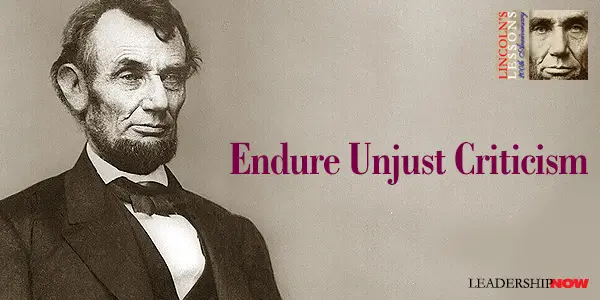
 Most of the time, Lincoln ignored criticism. He knew it would come. It had always been so. He wrote, “Human nature will not change. In any future great national trial, compared with the men of this, we shall have as weak and as strong, as silly and as wise, as bad and as good.” Only when he deemed it important enough to make a difference did he engage in the attack and offer a rebuttal and defend himself. But always, he kept a good sense of humor. He chose not to brood over unjust criticism. He advised, “Jealousy and suspicion never did help any man in any situation. There may sometimes be ungenerous attempts to keep a young man down, and they will succeed, too, if he allows his mind to be diverted from its true channel to brood over the attempted injury. Cast about, and see if this feeling had not injured every person you have known to fall into it.” Lincoln avoided quarreling, resentments and malice. He tried to exhibit patience and grace. Possessed with a sense of purpose greater than himself, he was able to look past petty concerns. In a letter to Cuthbert Bullitt he wrote, “I shall do nothing in malice. What I deal with is too vast for malice dealing.” Any leader will be criticized. How you handle it will determine whether or not you succeed or fail. In the Old Testament, God corrected Balaam through the mouth of a … uh … donkey. Any of us might be edified in the same way. It is best to endure criticism, learn what you can, and move on in spite of it. Of Related Interest:
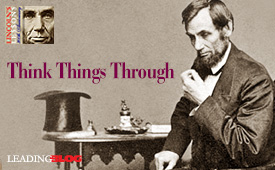 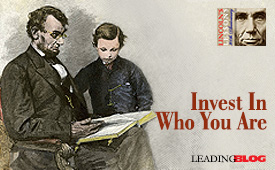
Posted by Michael McKinney at 03:57 AM
02.10.09

Lincoln’s Lessons: Listen To and Value Others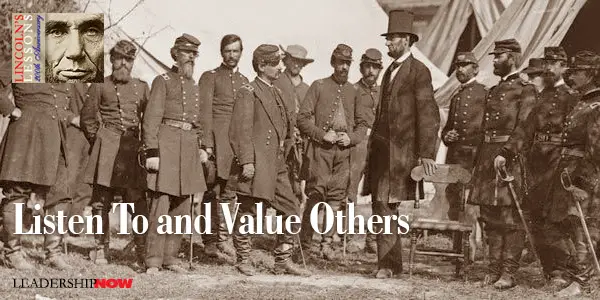
 Lincoln took the time to cultivate personal relationships with his subordinates so he could learn from them. He showed them respect even when their opinions differed and he made it clear that he valued their opinions. Lincoln's emphasis on soliciting the ideas of others and his concern for them is illustrated well in a story that Paul Johnson records in his book Heroes. “After the fall of Richmond, the Confederate capital, and on the same day Robert E. Lee finally surrendered, Lincoln went to see his secretary of state, with whom he often disagreed, and whom he did not particularly like. Seward had somehow contrived to break both his arm and his jaw. Lincoln found him not only bedridden but unable to move his head. Without a moment’s hesitation, the president stretched out at full length on the bed and, resting on his elbow, brought his face near Seward’s, and they held an urgent, whispered conversation on the next steps the administration should take. Then Lincoln talked quietly to the agonized man until he drifted off to sleep.” Johnson concludes, “Lincoln could easily have used the excuse of Seward’s incapacity to avoid consulting him at all. But that was not his way. He invariably did the right thing, however easily it might have been avoided. Of how many other great men might this be said?” Lincoln found time for individuals. Of Related Interest:
 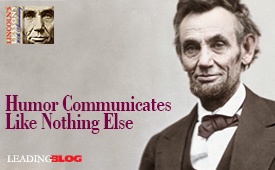
Posted by Michael McKinney at 12:07 AM
02.09.09

Lincoln's Lessons: Think Things Through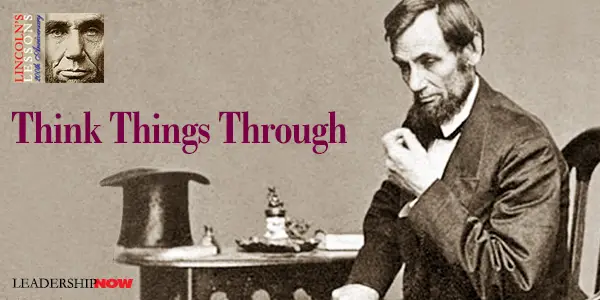
 Lincoln is not advocating indecisiveness; rather he is encouraging us to get all of the facts before deciding a matter. Especially in a time of crisis, calm, measured thought is important. Lincoln demonstrated the will to make tough decisions and without hesitation when necessary. But he insisted on getting all of the information available before making a decision. Often this entailed going out personally to get the facts firsthand. He took the time to consider all available solutions and their consequences. Furthermore, by selecting a solution that was consistent with his values and objectives, he was able to weave a theme through his decisions – connecting them – and build trust and authenticity in his leadership. Too often, issues are examined only in one dimension or by considering only the loudest voices. Rarely is that enough. It often leads to unintended consequences and inconsistent behavior. When you have taken the time to think a thing through, you will be better able to have the courage to stand behind your decisions and accept the consequences. You will possess a determinism born of conviction and not stubbornness. Of Related Interest:
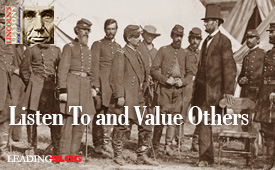 
Posted by Michael McKinney at 01:21 AM

Books About Abraham LincolnOn the occassion of 200th Anniversary of Abraham Lincoln's birth on February 12, we have assembled a list of some of the better books about Lincoln:





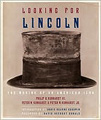
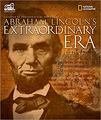

Posted by Michael McKinney at 01:19 AM
|
BUILD YOUR KNOWLEDGE


How to Do Your Start-Up Right STRAIGHT TALK FOR START-UPS 
Grow Your Leadership Skills NEW AND UPCOMING LEADERSHIP BOOKS 
Leadership Minute BITE-SIZE CONCEPTS YOU CAN CHEW ON 
Classic Leadership Books BOOKS TO READ BEFORE YOU LEAD |
|